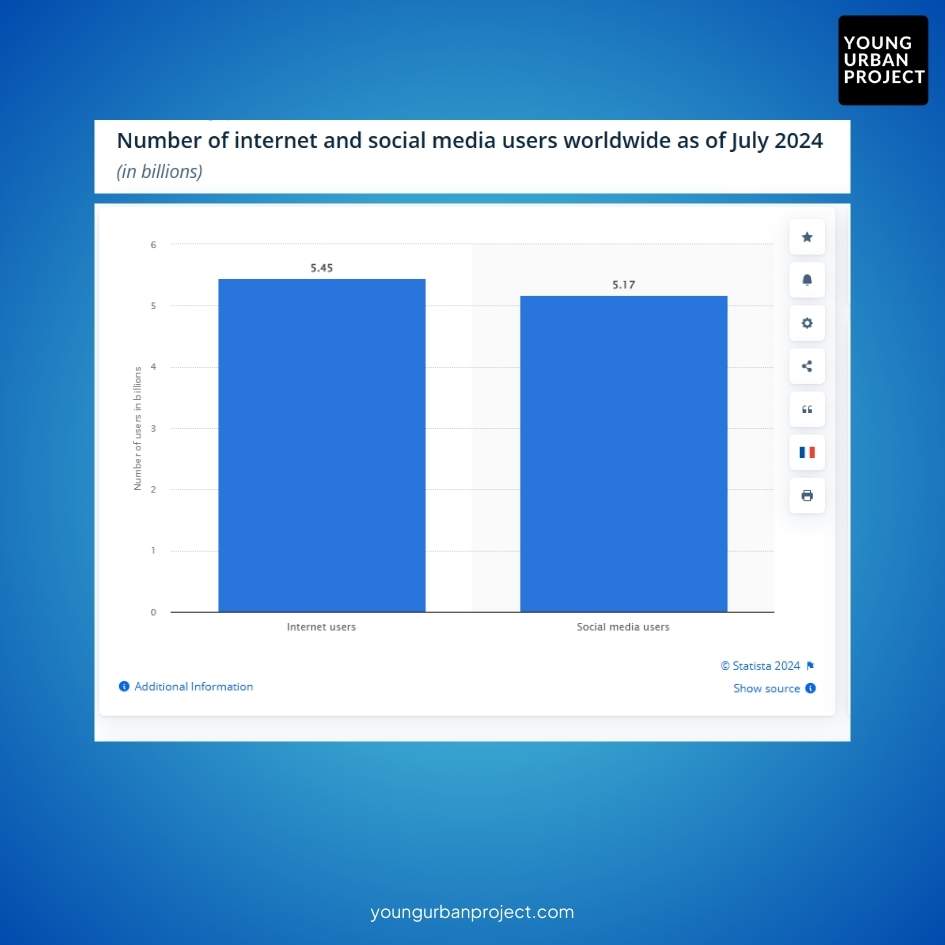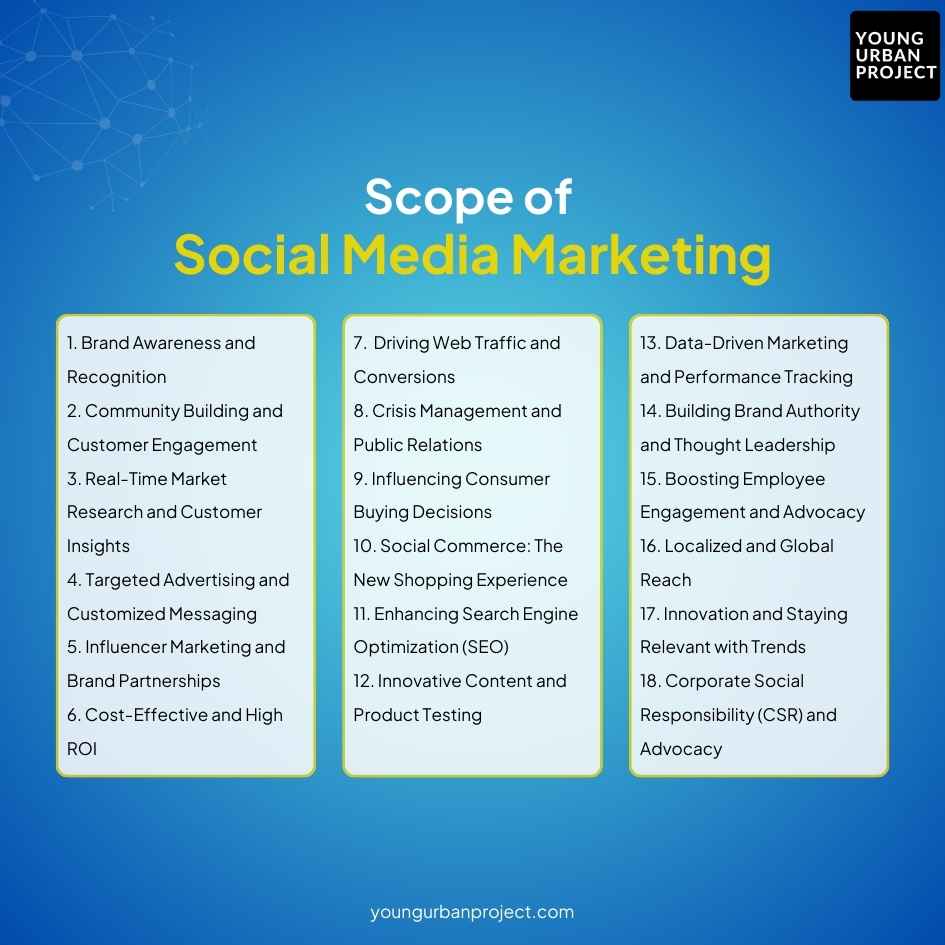Ever wondered why brands, from local startups to global giants, are so hooked on social media? It’s more than a trend—it’s a pivotal part of modern marketing strategies. Social media has transformed how companies interact with their audience, shifting the balance from traditional broadcast messaging to two-way, personalized engagement. But there’s much more to this field than meets the eye. Here, we’ll uncover the scope of social media marketing, dissect its elements, and explore its potential as both a powerful business tool and a promising career path.
Table of Contents
Did you know that around 63.7 percent of the world’s population are social media users?

What is Social Media Marketing? Types, Examples, and Key Components
Social Media Marketing Defined
Social media marketing (SMM) is using social media platforms to connect with an audience, build brand awareness, drive traffic, and generate sales. But it’s not just about promotional posts; it combines data, psychology, and creativity to cultivate authentic connections. The approach can vary widely depending on the platform and the intended audience, yet it always hinges on one core principle: fostering engagement.
Types of Social Media Marketing
There are several types of social media marketing, each suited to different goals and audiences:
- Content Marketing: Sharing blog posts, infographics, or videos to educate, entertain, or inspire.
- Influencer Marketing: Leveraging popular figures within specific niches to endorse a brand’s products or services.
- Paid Advertising: Using promoted posts or paid ads to target specific demographics.
- Community Building: Developing online communities where followers can discuss products and trends, such as Facebook groups or Twitter chats.
- User-Generated Content (UGC): Encouraging users to create content that promotes the brand organically.
Real-Life Examples of Successful Social Media Campaigns
Some campaigns have set the gold standard in SMM. Consider Airbnb’s #WeAccept campaign, which spread a message of inclusivity and generated millions of impressions, showcasing how social media can shape a brand’s identity.

Scope of Social Media Marketing
The scope of social media marketing is vast and continually evolving, giving businesses powerful avenues to reach, engage, and convert audiences effectively. Let’s dive into the multifaceted dimensions that illustrate the significant reach and impact of social media marketing:

1. Brand Awareness and Recognition
Social media platforms enable brands to maintain visibility and establish memorable identities through consistent messaging and visual storytelling. This visibility builds long-term recognition, as seen in campaigns by brands like Amul, which regularly engage followers with relevant and timely content.
2. Community Building and Customer Engagement
Platforms like Instagram, Facebook, and LinkedIn provide brands with opportunities to build engaged communities, transforming followers into loyal advocates. Through interactive content, regular engagement, and a relatable brand voice, brands can foster a community that shares values, leading to deeper connections and trust.
3. Real-Time Market Research and Customer Insights
Social media’s real-time engagement provides immediate insights into customer interests, preferences, and feedback. Through tools like social listening, brands can observe trends and conversations relevant to their industry, allowing them to make data-informed decisions and adjust strategies promptly.
4. Targeted Advertising and Customized Messaging
Social media platforms offer precise targeting capabilities that enable brands to reach their ideal customers. Platforms like Facebook and Instagram provide tools to target users based on demographic, geographic, and behavioral factors, allowing brands to deliver customized messages and maximize conversion potential.
5. Influencer Marketing and Brand Partnerships
Collaborations with influencers allow brands to tap into established audiences, building credibility and expanding reach. Influencers, especially on platforms like Instagram and YouTube, can authentically introduce products to audiences who trust their recommendations, making this an effective strategy for customer acquisition and brand awareness.
6. Cost-Effective and High ROI
Social media marketing is generally more affordable than traditional marketing, offering a high return on investment (ROI). Brands can start with organic content and scale up with paid promotions, making it accessible to businesses of all sizes and enabling them to compete on a level playing field with larger corporations.
7. Driving Web Traffic and Conversions
Social media serves as an effective channel for driving traffic to websites and increasing conversions. By adding CTAs (call-to-actions) in posts and ads, brands can guide users directly to their website or landing pages, making social media an integral part of the customer journey.
8. Crisis Management and Public Relations
Social media is invaluable for managing public relations and addressing issues in real time. During a crisis, brands can use platforms like Twitter and Facebook to provide timely updates, control the narrative, and build transparency with their audiences. Swift and honest responses often help brands turn challenges into opportunities for positive reinforcement.
9. Influencing Consumer Buying Decisions
Social media strongly influences buying decisions, thanks to social proof. Reviews, testimonials, and user-generated content give potential customers the confidence to try products or services. On Instagram, for instance, product tags and visuals showcase items in a way that encourages quick purchasing decisions.
10. Social Commerce: The New Shopping Experience
Social commerce lets brands create seamless shopping experiences within platforms. For example, Instagram and Facebook offer shopping features, allowing businesses to build product catalogs and create shoppable posts, reducing the friction in the buying journey. For consumers, this means they can discover, explore, and purchase products without leaving the app.
11. Enhancing Search Engine Optimization (SEO)
Although not a direct ranking factor, social media indirectly impacts SEO by generating increased engagement, helps with Blogger outreach, brand awareness, and external links. Engaged social media posts also boost branded search queries, which can positively impact a brand’s search rankings and overall online visibility.

12. Innovative Content and Product Testing
Social media allows brands to test new content formats, ad creatives, or products with minimal risk. For example, brands can A/B test their ads on Facebook or experiment with different formats like Instagram Stories, Reels, or YouTube Shorts to gauge audience response. This testing provides immediate feedback, enabling brands to refine their strategies quickly.
13. Data-Driven Marketing and Performance Tracking
Social media platforms come with detailed analytics and tracking tools, allowing marketers to monitor and adjust their strategies based on performance metrics. Data on engagement rates, impressions, reach, clicks, and conversions enable brands to make informed, data-driven decisions and optimize for better results.
14. Building Brand Authority and Thought Leadership
Sharing educational content, industry insights, or case studies on platforms like LinkedIn or YouTube allows brands to establish authority in their field. For B2B companies, these platforms are particularly valuable for publishing thought leadership content, showcasing expertise, and engaging with industry professionals.
15. Boosting Employee Engagement and Advocacy
Employee advocacy on social media is gaining traction as an effective strategy for brand expansion. By encouraging employees to share company news, updates, and content on their own social profiles, brands can reach broader audiences, humanize their image, and strengthen employee engagement and satisfaction.
16. Localized and Global Reach
Social media allows brands to operate on both local and global scales. Through geo-targeting and location-based campaigns on platforms like Instagram and Facebook, brands can reach specific communities or regional markets. This adaptability is crucial for companies with localized services or those looking to expand internationally.
17. Innovation and Staying Relevant with Trends
Social media thrives on trends, and brands that stay agile and adaptable to these changes enjoy a stronger connection with their audiences. Trends in short-form videos, interactive content like polls and Q&As, and AR filters on platforms like Instagram help brands remain relatable and engaging for diverse demographics.
18. Corporate Social Responsibility (CSR) and Advocacy
Many consumers expect brands to contribute to social causes and demonstrate corporate social responsibility. Social media enables brands to showcase their CSR efforts, promote sustainability practices, or address social issues relevant to their values. When done authentically, this resonates deeply with audiences, building brand loyalty and trust.
Careers in Social Media Marketing
The growth of social media marketing has opened up a diverse range of career paths. Let’s look at some of the most sought-after roles and what each entails.
Popular Career Roles in Social Media Marketing
- Social Media Manager: Overseeing the brand’s social strategy, content creation, and engagement metrics.
- Content Strategist: Creating and implementing content strategies that align with brand goals.
- Influencer Marketing Manager: Working with influencers to promote products or campaigns.
- Social Media Analyst: Using data analytics to monitor campaign success and optimize strategy.
- Community Manager: Engaging with followers, responding to comments, and fostering a sense of community.
Skills Required
This field demands a mix of soft and hard skills. Creativity, communication, and storytelling are essential, as is an understanding of analytics tools. Knowledge of paid advertising platforms (like Facebook Ads Manager or Twitter Ads) and content creation software (such as Adobe Creative Suite) can be significant advantages.
Why It’s a Promising Career
According to LinkedIn’s 2024 Emerging Jobs Report, social media marketing is among the top-growing fields globally. With brands dedicating more resources to digital engagement, social media marketing careers offer stability, growth, and an exciting work environment.
Advantages and Disadvantages of Social Media Marketing
No marketing channel is perfect, and social media is no exception. Let’s explore the pros and cons.
Advantages of Social Media Marketing
- Cost-Effective Marketing: Compared to traditional media, social media is inexpensive, with the potential for high returns.
- Instant Brand Feedback: Social media provides brands with instant feedback and user sentiment.
- Increased Brand Authority: By regularly engaging and providing value, brands establish authority in their industry.
- Viral Potential: There’s always a chance for a campaign to go viral, exponentially increasing reach.
Disadvantages of Social Media Marketing
- Time-Consuming: It requires constant monitoring, content creation, and engagement.
- Risk of Negative Publicity: Negative reviews, complaints, or a poorly executed post can go viral, potentially damaging a brand’s reputation.
- Algorithm Dependence: Platforms regularly change algorithms, making it challenging to maintain consistent visibility.
Future of Social Media Marketing: Trends and Innovations
The future of social media marketing is marked by technological advancements and a shift toward user-first content. Here are some emerging trends and predictions that are shaping the field.
1. AI and Automation in Social Media
Artificial Intelligence is revolutionizing SMM through automation tools that can handle customer queries, generate insights, and even create content. Chatbots powered by AI are now common, streamlining customer service and enhancing user experience.
2. Rise of Social Commerce
Social commerce—buying and selling directly on social platforms—is growing rapidly. Instagram, and Facebook, have integrated shopping features, making it easier for consumers to shop without leaving the app.
3. Personalized User Experiences
Consumers expect brands to know them. Personalization in social media, whether through AI-powered recommendations or segmented advertising, will be critical in maintaining engagement.
4. Virtual and Augmented Reality
VR and AR are becoming popular for immersive experiences. Brands are experimenting with VR tours, AR product try-ons, and other interactive elements to engage users on a deeper level.
5. Ephemeral Content and Authenticity
Short-lived, “in-the-moment” content like Instagram Stories and Snapchat’s Snaps has gained massive popularity. Ephemeral content gives brands a way to stay top-of-mind without overloading their audience with posts.
6. Increased Focus on Sustainability and Transparency
Consumers, especially Gen Z, value transparency and sustainability. Brands that openly address these topics on social media and showcase genuine efforts will likely see increased engagement and loyalty.
How to Start a Career in Social Media Marketing?
Starting a career in social media marketing doesn’t require a specific degree. Many professionals in this field have backgrounds in communications, marketing, or psychology, while others are self-taught.
Steps to Get Started:
- Build Your Social Presence: Having a personal brand on social media is crucial. It’s a real-time portfolio of your skills.
- Learn the Basics: Familiarize yourself with platforms, engagement metrics, and content strategies. Numerous online courses offer beginner to advanced lessons on social media marketing.
- Stay Updated on Trends: This industry evolves quickly. Keep up with platform updates, new tools, and emerging content trends.
- Experiment with Content Creation: Test your skills by creating and analyzing posts, stories, and short-form videos. Understanding how to produce engaging content across different platforms is invaluable.
Conclusion
The scope of social media marketing is broad and ever-expanding. As a discipline, it has gone from an optional addition to a must-have for brands of all sizes. Its career potential, too, is massive, offering varied roles that combine creativity, strategy, and technology. For businesses, mastering social media marketing can mean the difference between a brand that resonates and one that’s forgotten.

